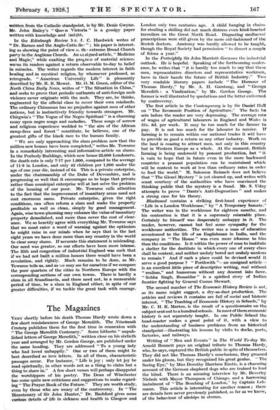The Magazines
VERY shortly before his death Thomas Hardy wrote down a few short reminiscences of George Meredith. The Nineteenth Century publishes them for the first time in connexion with " The George Meredith Centenary." Some hitherto " unpub- lished letters of George Meredith," written close on his sixtieth year and arranged by Mr. Gordon George, are published under the same heading. They are addressed " To a young lady who had loved unhappily." One or two of them might be best described as love letters. In all of them, characteristic passages occur. For instance, " Life is joy ; only let joy be read spiritually, in other words not as a thing to claim but a thing to share in." A few short verses will perhaps disappoint the worshippers of his poetry. The Dean of Winchester has some quite new criticisms and suggestions to make regard- ing " The Prayer Book of the Future." They are worth study, even by those who are weary of the controversy. In " The Bicentenary of Sir John Hunter," Dr. Bashford gives some curious details of life in sickness and health in Glasgow and
London only two centuries ago. A child hanging in chains for stealing a shilling did not much distress even kind-hearted travellers on the Great North Road. Disgusting mediaeval prescriptions were still given by the more old-fashioned of the Scotch doctors. Anatomy was hardly allowed to be taught" though the Royal Society had permission " to dissect a couple of felons a year."
In the Fortnightly Sir John Marriott discusses the industrial outlook. He is hopeful. Speaking of the forthcoming confer- ence, he writes that " it is hardly too much to say that these men, representative directors and representative workmen, have in their hands the future of British Industry." Two very readable literary papers include " The Humour of Thomas Hardy," by Mr. A. H. Garstang, and " George Meredith : a Vindication," by Mr. Gordon George. The former is well illustrated by quotations and the latter enlivened by controversy.
The first article in the Contemporary is by Sir Daniel Hall on " The Economic Position of Agriculture." The facts he sets before the reader are very depressing The average rate of wages of agricultural labourers in England and Wales is 31s. 8d. per week. It may be too much for the farmer to pay. It is not too much for the labourer to receive. If farming is to remain within our national trades it will have to provide as good a return as any other industry. Work on the land is ceasing to attract men, not only in this country but in Western Europe as a whole. At the moment, British farming is being undersold by peasant production, but " it is vain to hope that in future even in the more backward countries a peasant population can be maintained which will be content to work at less than ordinary rates in order to feed the world." M. Salomon Reinach does not believe that " The Glozel Mystery " is yet cleared up, and writes with scant courtesy of the authorities who have convinced the thinking public that the mystery is a fraud. Mr. S. Udny attempts to prove " Dante's Anti-Dogmatism " and makes a strong case for his theory.
Blackwood contains a striking first-hand experience of "Life in a London Workhouse," by " A Temporary Inmate." The writer was in the workhouse for eighteen months, and his contention is that it is a supremely miserable place. Certainly he himself was desperately unhappy in it. The reader, however, cannot but feel some sympathy for the workhouse authorities. The writer was a man of education accustomed to the life of an Englishman in India„ and the company in " The House " was even more irksome to hint than the conditions. Is it within the power of man to institute a shelter for the destitute in which every one of every class shall be content, and neither unduly bored not unduly anxious to remain Y And if such a place could be devised would it serve a good purpose Y " Forthwith "—an unsigned article- – is an..ccellent little piece of descriptive writing, real without " realism," and humorous without any descent into farce. " Sobha Singh, Ressaldar " is a spirited story of Indian frontier fighting by General Cosmo Stewart.
The second number of The Economic History Review is not, as its name might suggest, a dry-as-dust production. The articles and reviews it contains are full of social and historic interest. " The Teaching of Economic History in Schools," by Mr. C. H. K. Marten, is the result of a questionnaire on the subject sent out to a hundred schools. In most of them economic
history is not separately taught. In one Public School the head-master makes a great point of it, with a view tO
the understanding of business problems from an historical standpoint—illustrating his lessons by visits to docks, ports, factories, and railways.
Writing of " Men and Events " in The World To-day Mr. Arnold Bennett pays an original tribute to Thomas Hardy,
who, he says, captured the British public in spite of themselves. They did not like Thomas Hardy's conclusions, they groaned under his gloom, but they recognized his great genius. " The Seeing Eye," by Miss Dorothy Harrison Eustis, is a charming account of the German shepherd dogs who are trained to lead the blind. There is an amusing interview by Mr. Beverley Nichols with Mayor Thompson of Chicago, and a harrowing instalment of " The Bombing of London," by Captain Leh-
Mann. This article is interesting for another reason ; there are details here never previously published, as far as we know, of the behaviour of airships in storm.






































 Previous page
Previous page